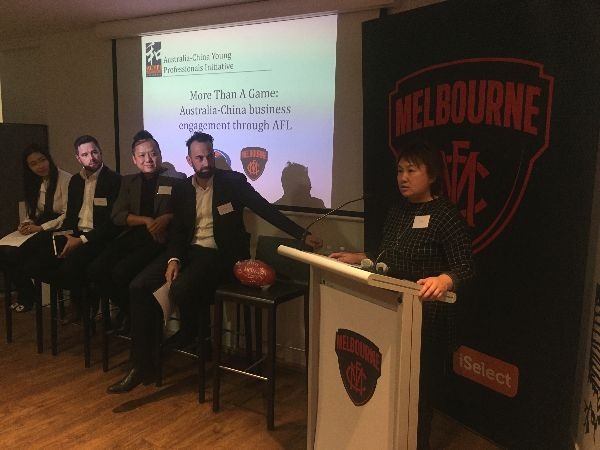Sport in Australia is a core part of our culture, but it also contributes a significant amount to the country’s economy, generating an estimated $12.8 billion in income a year. It also plays a crucial role in our engagement with other countries, both on and off the field.
On Monday night, the Australia-China Young Professionals Initiative (ACYPI) and the Melbourne Football Club came together to present ‘More Than A Game: Australia-China business engagement through AFL’.
A panel of five speakers from Chinese and Australian backgrounds came together to shed light on the benefit’s that football can have beyond our nation’s borders.
The event explored some of the landmark political and cultural achievements brought about through the work of the AFL.
Panellist David Stevenson, General Manager of AFL China, India & AFLX Project Manager, explained how the inaugural 2017 round eight Shanghai match produced some unexpected outcomes. Instead of taking place at a home stadium, the round eight showdown between Port Adelaide and the Gold Coast took place at Jiangwan Stadium in Shanghai.
This match was a ground-breaking step not only for the AFL, but for any sporting code in Australia. Until that moment, no one had crossed Australian / New Zealand borders for a regular round competition match.
“It sold out in under two hours and we had the largest broadcast audience that AFL has ever had. Bigger than any Grand Final. And that’s pretty exciting when you think about it,” Stevenson said.
But perhaps even more significant than the broadcasting figures were the developments the game generated outside the sporting sphere.
The Shanghai match thrust sports diplomacy onto Australia’s radar at a crucial time in Australia-China’s political relations.
Stevenson told how Steven Ciobo, Australia’s Minister for Trade, Tourism and Investment, had had his Chinese visa application denied three times. After undertaking work alongside Stevenson, he finally had his application granted to allow him to attend the 2017 Shanghai match.
“He hosted, at the game, the first meeting between the Australian government and anyone from the Chinese government in eight months. And it happened at an AFL game,” said Stevenson.
Beyond the benefits to Australia-Chinese business relations, the panellists explored the role that AFL has played in allowing other cultures to assimilate into Australian society.
Sarah Loh, CEO of the South Metro Junior Football League, told the audience about the role sport played in her transition from Chinese to Australian culture.
Having moved to Australia when she was just seven years old, fitting into the 1970’s Melbourne society was an unexpected challenge for Loh.
“In 1977, we couldn’t even walk out of the house without hearing constant jibes about being Chinese,” she said.
“As a seven-year-old, at primary school, I didn’t think I belonged.”
But after picking up a ball one lunch time and showing off her skills learnt from years of playing backyard sports with her two older brothers, Loh had finally found a commonality with Australian’s.
“When I started playing sport, people just started to accept me,” she said.
Chinese immigrant and Diversity and Fan Engagement Executive at the Melbourne Football Club, Elena Gao, agreed.
“My experience is that sport is an excellent medium for cross cultural engagements, as it a universal language,” she said.
Loh’s love for football saw her obliterate more than just cultural barriers, as she paved the way for women’s leadership in the Australian sporting industry.
“I was the first female CEO to manage a football league in the country. So that was a real honour for me, I didn’t actually know that. And then, of course, being the first person of Chinese decent to run a football league,” she said.
On the back of these cultural and political milestones, the AFL and Melbourne Football Club have begun turning their attention to the local Chinese and multi-cultural communities
Stevenson says the first AFL China Strategy is focussed on shifting the vision of the game in a more culturally inclusive and welcoming direction.
“Our vision in the past has been very much, ‘AFL. Australia’s game.’,” he said.
“But we think that there’s a shift that we need to make and that’s turning it from ‘Australia’s Game’, to ‘My Game’.”
Melbourne Football Club have already stepped up to make this vision a reality by introducing the ‘Welcome Game’, which debuted last year.
The event debuted last year and was the first opportunity many to be properly introduced to this unique sport, allowing 7,00 people to experience AFL for the first time.
Panellist Ryan Earles, General Manager of Marketing and Growth at the Melbourne Football Club, described the game as being all about ‘attracting new audiences’ to the game.
“It’s Melbourne’s marquee sporting event,” he said.
“It’s the celebration of diversity and inclusivity.
“Whilst there’s a strong focus on engaging multicultural communities it also goes beyond that.
“It’s about making everyone feel welcome to attend an AFL game.”
As the AFL set’s its sights beyond the typical ‘all-aussie’ market, it’s just a glimpse of the potential the sport has to bring about impressive political and cultural change.
Hannah Matchett is a second year Bachelor of Media and Communications (Journalism) student at La Trobe University. You can follow her on Twitter @matchett_hannah






